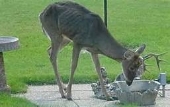




 --not just washed (http://county.wsu.edu/king/gardening/mg/factsheets/Fact%20Sheets/Using%20Manure%20as%20Compost.pdf)
--not just washed (http://county.wsu.edu/king/gardening/mg/factsheets/Fact%20Sheets/Using%20Manure%20as%20Compost.pdf)
 1
1




Dave's SKIP BB's / Welcome to Permies! / Permaculture Resources / Dave's Boot Adventures & Longview Projects


















Homesteading in Central Virginia
Our Website




Shine on! The world needs your beautiful light.








Dawn Conrad wrote:Nicole, I have seven Runner ducks that reside in my garden. However I do raise my veggies in raised beds that are bordered with used wine bottles so the ducks cannot get into them. They happily dine on any bugs/slugs/flying insects they can catch and choice greens within their reach. Two reasons for the raised beds, one being the concern regarding salmonella and the other being that they would clean the veggies out in no time! I do allow them to freely frolic in the beds that are finished producing for the year, so they fertilize a bit and enjoy an end of season treat at the same time.
Come join me at www.peacockorchard.com
 1
1




Come join me at www.peacockorchard.com




 1
1



















Ann Torrence wrote:I did some math over here on my perceived risks of salmonella from my backyard flock.
 1
1








Alder Burns wrote:This is the first I have heard of any bacteria translocating into and through the vascular system of a plant, and the link doesn't work for me! If it's true it would be a game changer for the use of all manner of manures and composts. I have long relied on burial under plants for the safe and useful disposal of even humanure and pet waste....under plants for cooked use or that bear their edible yield well above ground.





|
She laughed at how small it was, and now it is even smaller. Poor tiny ad:
Rocket Mass Heater Resources Wiki
https://permies.com/w/rmh-resources
|




